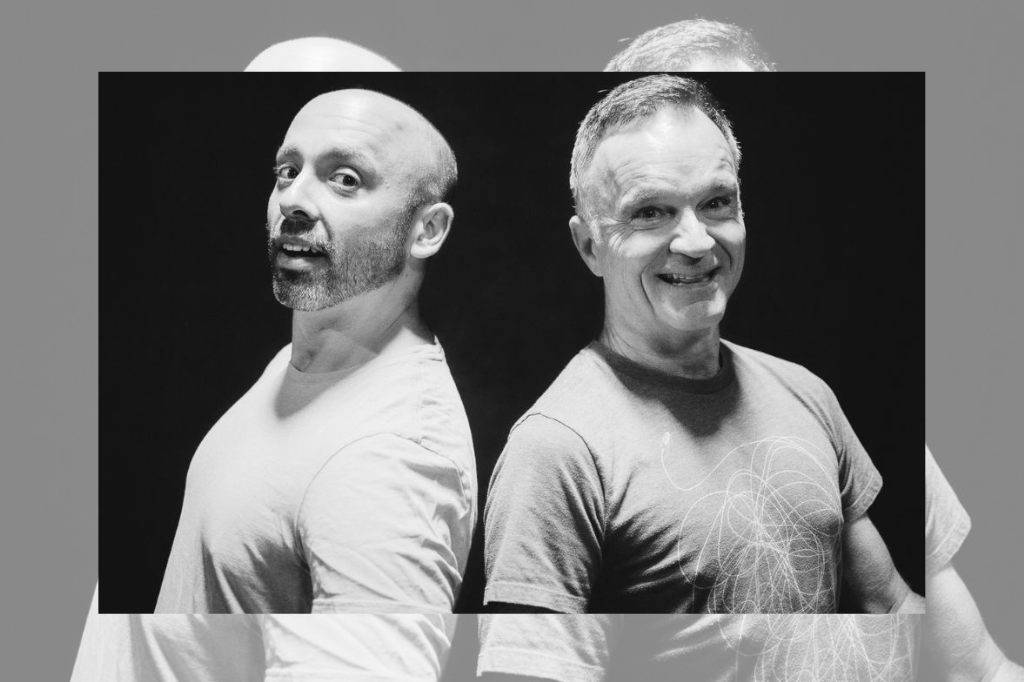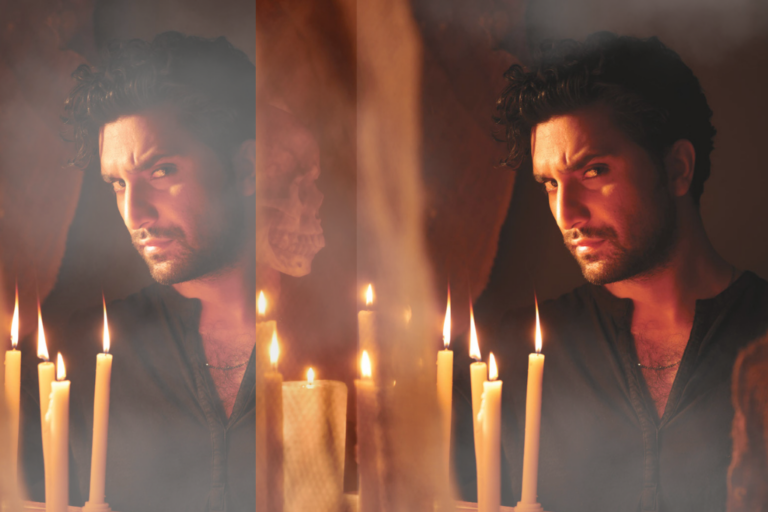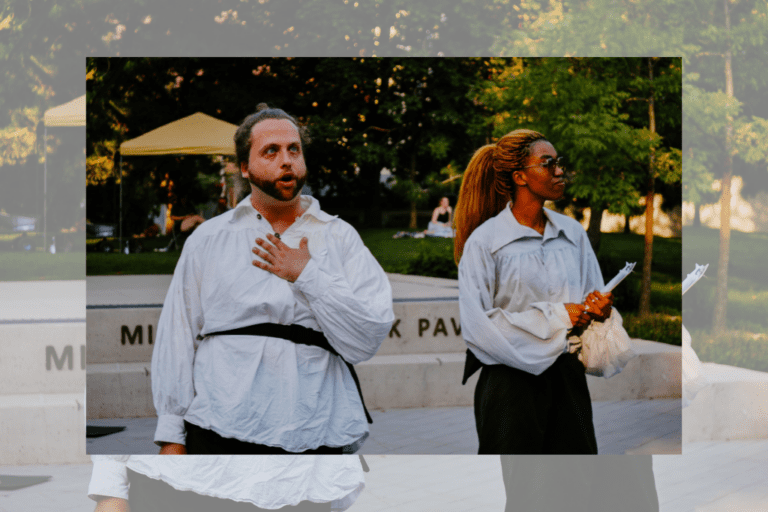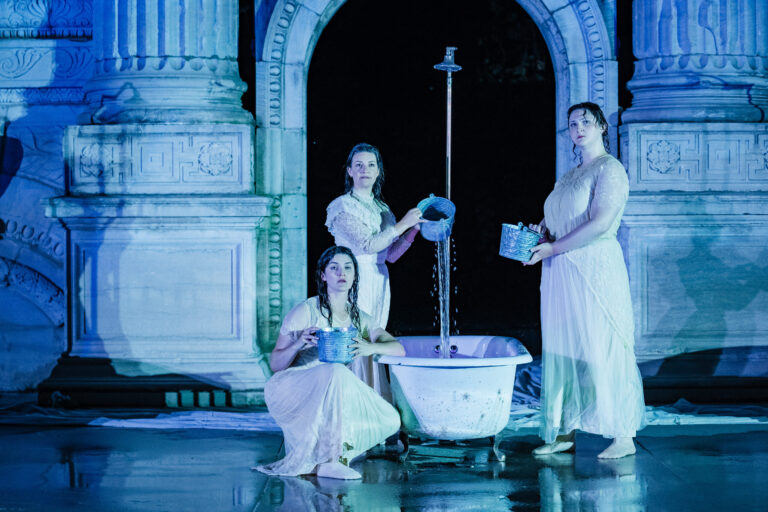REVIEW: Gay for Pay with Blake & Clay at Gay for Pay Productions/Crow’s Theatre
The thought of seeing the same show featuring the same actors twice in four months might be a daunting one. But make no mistake: Gay for Pay with Blake & Clay doesn’t lose its steam the second time around.
Fresh off their triumphant run at the 2022 Toronto Fringe Festival, Gay for Pay with Blake & Clay has brought a limited revival to Streetcar Crowsnest’s Studio Theatre. If you were lucky enough to nab a ticket to their award-winning Fringe production, the show will be familiar. But several small changes to the script, and, perhaps more impactfully, the performances, keep the production fresh and exciting, regardless of how many times you’ve seen it.
Daniel Krolik and Jonathan Wilson resume their roles as Blake and Clay, two out-of-work gay actors who are definitely interested in your relationship with any local casting directors. But more importantly, they’ve teamed up to create a masterclass to teach straight male actors how to ace the ultimate, Oscar-winning part: a gay man.
If this sounds absurd at first, you’ll quickly realize that the premise is actually absurdly realistic. After all, the number of straight male actors who, to this day, we applaud merely for their bravery in “playing gay” is enough to make the mind reel. But it’s this brutally unflinching satire that gives this show much of its emotional impact.
Filled to the brim with charming and sometimes biting humour, co-writers Krolik and Curtis Campbell’s script is fast-paced and dizzyingly witty. From the moment the show starts and Blake and Clay earnestly explain why it’s so important to teach the new, woke generation of straight men to play gay (after all, they moisturize their faces now, they’re halfway there), it’s clear that the jokes and going to be coming fast and hard. Not a euphemism, just a fact.
While Blake and Clay’s six-point process to becoming the best not-gay actor playing gay possible hasn’t changed in the past four months — after all, as they’ll assure you, it’s a tried and true method from two verifiable gays — the small but mighty creative team of Krolik, Campbell, stage manager James Hyett, and producer Rachel Kennedy has expertly recalibrated their production to fit the new venue. Crow’s Theatre’s Studio is considerably smaller than the original playing space, but both Krolik and Wilson have dialed back their performances, not in energy but in volume and intensity to suit the smaller theatre. The close quarters allow them more opportunities to play with the audience, opportunities that both performers take full advantage of.
It’s clear that Krolik’s Blake is the leader of the duo, driving much of the seminar and keeping the duo (mostly) on track. But Wilson’s Clay never misses an opportunity for a sly glance to the audience, or a nuanced bit of physical comedy. It’s a masterclass in comedic timing and subtlety. The two performers have wonderful chemistry, both with one another and with the audience, and the pace of their jokes is a clear indication of the amount of work that’s gone into this show.
The comedy doesn’t come simply from the plentiful punchlines. Wilson repeatedly uses careful and egregiously incorrect pronunciation of words like “film” (“fil-um”) in a bit that never gets old. And Krolik’s Blake loses himself in thought on numerous occasions, devolving into borderline dissociative monologues that are equal parts hilarious and compelling.
Although the production is largely the same as its July iteration, there are some small and timely changes that keep the production current. While I don’t remember all of the original jokes word-for-word, the entire opening night audience sighed a collective breath of grief at a brief, mournful ode to the late, great Leslie Jordan. And each time Blake and Clay duck behind their projection screen to don a new “character” or outfit, it’s easy to hear snatches of their intentionally quiet conversations (“I think it’s going well!”), details that either weren’t present in the Fringe production, or that I missed from the back row.
And the twist — THE TWIST — is somehow even more impactful in close proximity to the performers. I won’t spoil the surprise for the unfortunate souls who missed out on Gay for Pay’s Fringe run, but the quiet closeness of the brilliant moment is amplified into an almost deafening silence this time around.
Being so close to the audience allows both Krolik and Wilson to dial back on their performances and focus more on their meaning than their projection. The brilliance of this iteration of the play is that it really allows the audience to suspend their disbelief and imagine they are in a workshop; the experience borders on immersive theatre.
With razor-sharp writing and a flair for the dramatic, Gay for Pay with Blake & Clay is a bucket of laughs with a hefty dose of heart. And whether you’ve attended the workshop in the past or it’s your first time, the message in the show is one that everyone who has ever been involved in the world of entertainment needs to hear.
Gay for Pay with Blake & Clay runs at Streetcar Crowsnest November 16–27, 2022.















Comments